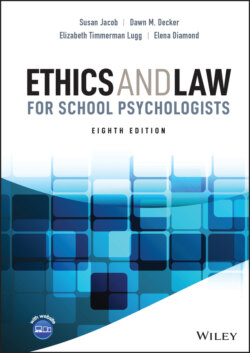Читать книгу Ethics and Law for School Psychologists - Susan Jacob - Страница 9
WHAT’S IN THE BOOK
ОглавлениеChapter 1 provides an introduction to ethical codes; the DECIDE ethical-legal decision-making model (Diamond et al., 2021); and the four broad ethical principles of respect for the dignity and rights of all persons, professional competence and responsibility, honesty and integrity in professional relationships, and responsibility to schools, families, communities, the profession, and society. We also describe ethics committees and sanctions for unethical conduct. Chapter 2 provides an introduction to the legal underpinnings of school-based practice and to public school law that protects the rights of students and their parents. We also address certification and licensure of school psychologists—mechanisms that help to ensure that psychologists meet specified qualifications before they are granted a legal sanction to practice. The chapter closes with a brief discussion of tort liability of schools and practitioners. In Chapter 3, we discuss privacy, informed consent, confidentiality, privileged communication, and record keeping—ethical-legal concerns that cut across all of the school psychologist’s many roles.
The remaining chapters focus on ethical-legal issues associated with specific roles. These chapters build on foundational knowledge of ethics and law presented in the first three chapters. Chapters 4 and 5 address the delivery of services to students with disabilities. Psychoeducational assessment within the context of a school psychologist–client relationship is discussed in Chapter 6. Chapter 7 addresses academic and behavioral interventions within a multitiered system of service delivery and therapeutic interventions such as counseling. Chapters 8 and 9 focus on indirect services. We discuss ethical-legal issues associated with consultative services to teachers and parents in Chapter 8 and systems-level consultation in Chapter 9. A number of special consultation topics are covered in Chapter 9, including the ethical-legal concerns associated with large-scale assessment programs (high-stakes testing, screening to identify students at risk for harm to self or others); instructional policies and practices (grade retention, instructional grouping, programs for English learners and gifted and talented students); school discipline; and discrimination, harassment, and bullying. In Chapter 10, ethical-legal issues associated with research are discussed, and Chapter 11 provides a brief overview of issues associated with school-based supervision of school psychologists in training. And, finally, in Chapter 12, we discuss advocacy.
